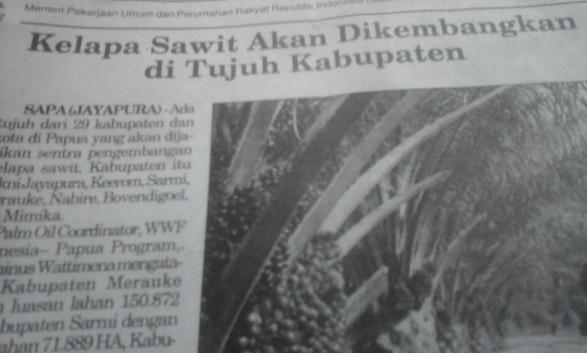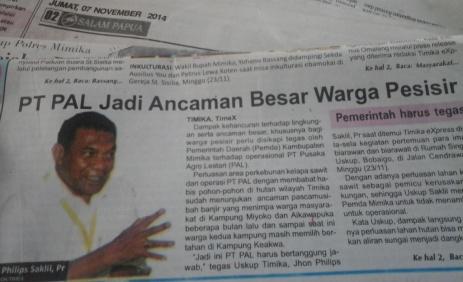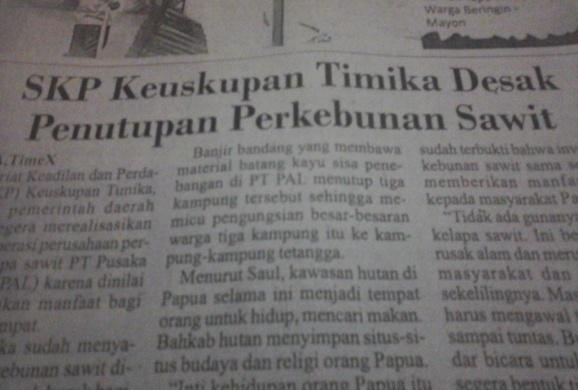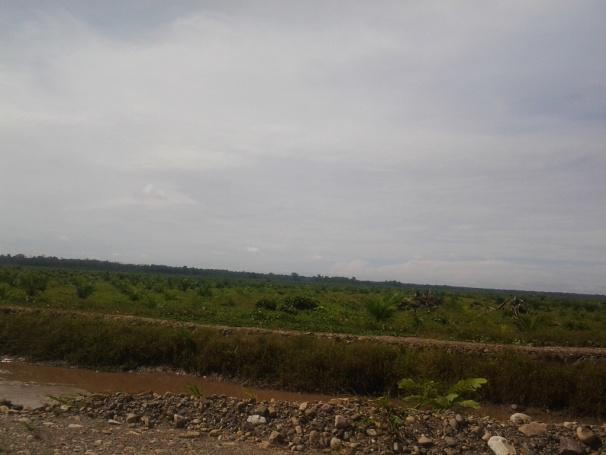Oleh Santon Tekege***
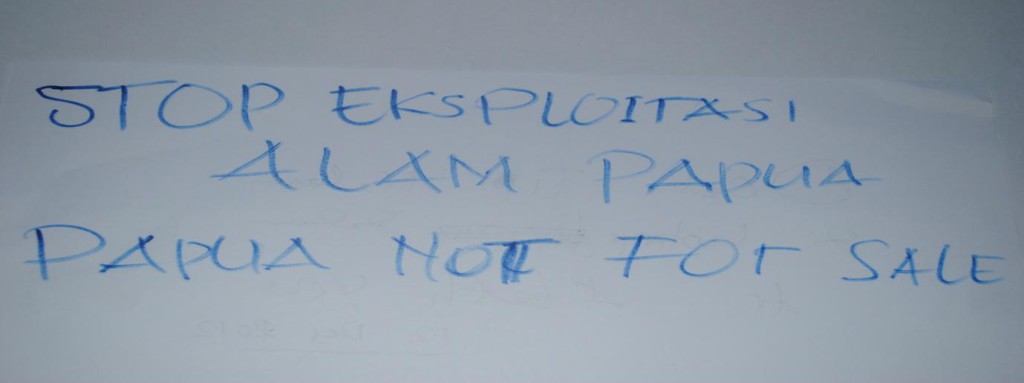
Pengantar
Dalam amanat UU No. 21 tahun 2001 tentang Otonomi Khusus “Otsus” di tanah Papua diberikan untuk menjawab isu Papua Merdeka. Bahkan Otsus itu dinilai akan menjawab segala persoalan Papua. Tetapi dengan maksud diberikan Pemerintah Indonesia agar isu Papua merdeka itu padam dengan jalan meningkatkan kesejahteraan.
Keinginan pemerintah itu dinilai benar untuk meniadakan isu Papua Merdeka, memajukan nasionalisme Indonesia di Tanah Papua. Namun kehendak pemerintah Indonesia itu tidak tercapai. Dikatakan demikian karena setelah adanya Otsus untuk Papua malah menambah persoalan yang semakin bahaya bagi orang asli Papua. Bahkan diperkirakan orang asli Papua menjadi minoritas dan pemusnahan pun bisa saja terjadi ketika melihat kenyataan semakin banyak orang asli meninggal atau ditembak aparat keamanan yang bertugas di seluruh di tanah Papua.
Banyak pihak menilai bahwa pemberian Otsus itu sebagai jalan masuk pemerintah Indonesia khususnya aparat keamanannya untuk menegakkan keutuhan NKRI di tanah Papua. Justru karena itu, Orang Asli Papua (OAP) merasa dikorbankan atau terjadi penembakan di mana-mana notabene pelakunya adalah aparat keamanan Indonesia di seluruh Papua. Bukan hanya itu, sumber daya alam Papua pun dikuras habis-habisan oleh pemerintah Indonesia dan para kapitalis Indonesia dan Asing di negeri Papua. Para kapitalis dibuka perusahan di mana-mana dan beckup oleh aparat keamanan pada setiap perusahan yang berada di tanah Papua. Pemerintah Indonesia akan berpikir bahwa kehadiran para kapitalis melalui perusaha-perusahan itu sebagai proses perkembangan dari zaman modernisasi yang akan berdampak baik kepada pemerintahan bahkan akan mendapatkan keuntungan besar tanpa berpikir dampak bencana terhadap lingkungan hidup di tanah air Indonesia ((Baca Pedoman Umat Katolik dalam Melestarikan Lingkungan Hidup dan Kementerian Lingkungan Hidup RI 2014)). Apalagi kalau kita biacara soal kehancuran lingkungan hidup di tanah Papua yang semakin gencar terdengar di mana-mana. Misalnya kehadiran perusahan kelapa sawit yang akan dibangun di mana-mana di seluruh tanah Papua. Perusahan-perusahan yang berada di tanah Papua di belakangnya adalah para aparat keamanan Indonesia (TNI dan POLRI).
Kelapa Sawit Akan Dikembangkan Beberapa Daerah di Seluruh Papua
Pemerintah Propinsi Papua berpikir bahwa dengan kehadiran kelapa sawit dapat memberikan kesejahteraan masyarakat Orang Asli Papua. Pemerintah Propinsi Papua tanpa berpikir dampak kerugian dan bencana bahkan tanpa berpikir pentingnya udara segar, diberikan ijin pengoperasian kelapa sawit di seluruh tanah Papua. Pemerintah semacam itu dinilai bahwa pemerintahan yang dibangun daerahnya dengan pembangunan berkontekstual Papua. Adalah pemerintahan yang buta dan sangat keliru dalam pembangunan untuk meningkatkan kesejahteraan masyarakat berkonteks setempat.
Kawasan Hutan Papua termasuk salah satu hutan target konservasi dan percepatan pembangunan, serta peningkatan nilai tambah kelapa sawit di pasar global. Untuk mencapai target pemerintah Indonesia ini, Propinsi Papua sudah menjadikan beberapa kabupaten sebagai pusat pengembangan kelapa sawit. Kabupaten-kabupaten itu adalah kabupaten Merauke dengan luas lahan 150.872 ha, Kabupaten Sarmi dengan luas lahan 71.889 ha, Kabupaten Keerom dengan luas lahan 18.338 ha, kabupaten Jayapura dengan luas lahan 99.737 ha, kabupaten Nabire dengan luas lahan 32.000 ha, kabupaten Timika dengan luas lahan 77.660 ha, dan kabupaten Boven Digoel dengan luas lahan 385.167 ha. Palm Oil Coordinator, WWF Indonesia-Papua Program memperlihatkan bahwa ternyata sebagian hutan Papua akan digunakan perusahan kelapa sawit di propinsi Papua. WWF Indonesia sejak tahun 2014 telah menjadikan propinsi Papua dan Papua Barat sebagai pusat pengembangan perusahan kelapa sawit ((Kelapa Sawit Akan Dikembangkan di Tujuh Kabupaten di Propinsi Papua. Baca media lokal “Salam Papua” edisi 16 Februari 2015.)).
Kompilasi data sekunder yang dikumpulkan oleh WWF Indonesia menunjukkan bahwa sampai dengan tahun 2014, kurang lebih terdapat 30 perusahan di tujuh kabupaten di propinsi Papua yang telah mendapat ijin prinsip dari kementerian kehutanan dan sekitar 24 perusahan telah memperoleh Izin Usaha Perkebunan (IUP) dari kementerian Pertanian untuk segera merealisasikan tahapan usahanya. Keberadaan investasi perkebunan kelapa sawit di Papua ((Ibid;)).
Walaupun demikian, keberadaaan investasi perkebunan kelapa sawit di Papua diharapkan dapat mendorong perekonomian daerah tetapi disisi lain tidak melupakan keberadaan lingkungan dan nilai-nilai kearifan masyarakat hukum adat Papua. Kenyataan justru banyak praktek pengelolaan perkebunan kelapa sawit yang menuai konflik dan kekerasan jika perusahannya diamankan oleh aparat keamanan Indonesia di Papua. Artinya di satu pihak, perusahan menjalankannya tekanan dari atas (penggunaan aparat keamanan militer) dan di lain pihak masyarakat menekankan hak atas tanah adat. Kedua pihak ini sering bertikai dan konflik dan kekerasan. Namun yang menjadi korban selama ini adalah masyarakat yang punya tanah adat di seluruh Papua.
Perusahan Kelapa Akan Mengancam Masyarakat Asli Kamoro dan Amungme
1. Sikap Gereja Keuskupan Timika
Alam semesta dengan segala isinya diciptakan dan dikehendaki oleh Allah sendiri. Gereja sebagai persekutuan umat beriman mempunyai kewajiban untuk menanggapi dan melaksanakan kehendak Allah itu. Tanggapan manusia akan kehendak Allah itulah yang disebut dengan iman. Oleh karena itu, keterlibatan Gereja dalam menjaga, memperbaiki, dan melestarikan lingkungan hidup hendaknya lebih didasari pada panggilan iman daripada sebagai sebuah reaksi terhadap berbagai persoalan lingkungan hidup yang akhir-akhir ini terus berkembang. Apapun keterlibatan Gereja dalam menjaga keutuhan ciptaan merupakan perwujudan iman. Cinta terhadap Allah dapat diwujudkan dalam cinta terhadap ciptan-Nya. Dengan dasar iman itu juga, para Bapa Gereja memberikan perhatian dan gagasan-gagasan yang cemerlang sehubungan dengan tata kelola dunia yang bermartabat dan memberi ruang bagi kehidupan semua makhluk. Termasuk didalamnya adalah kepedulian para Bapa Gereja terhadap masalah-masalah yang berhubunngan dengan lingkungan hidup ((Bdk. Konsili Vatikan II, Konstitusi Pastoral Gaudium et Spes, Penerbit Obor, Jakarta 1933, hal.,547.)).
Dalam dokumen Solicitiudo Rei Socialis (Keprihatinan-keprihatinan Sosial) Paus Yohanes Paulus II kembali menegaskan bahwa kemajuan jaman sebagai hasil dari pengembangan hidup manusia, harus tetap memberikan sikap hormat terhadap makhluk ciptaan. Sikap hormat itu didasarkan pada tiga pertimbangan: pertama, manusia tidak dapat memenuhi kebutuhan ekonominya dengan mengorbankan pelbagai glongan ciptaan, entah bernyawa atau tidak, margasatwa, tumbuh-tumbuhan dan unsur alam yang lain. Alam diciptakan tidak hanya untuk kebutuhan hidup manusia saja, oleh karenanya, manusia juga harus mempunyai rasa solidaritas dengan ciptaan yang lain. Ciptaan yang lain juga membutuhkan pangan dan papan untuk hidup. Kebutuhan hidup manusia dipenuhi dengan tetap memperhatikan kebutuhan hidup makhluk lain. Kedua, manusia perlu menyadari bahwa sumber daya alam yang ada itu terbatas, meskipun ada sumber daya alam yang dapat diperbaharui. Jika manusia memanfaatkan sumber daya alam tanpa memperhatikan kelangsungan hidup alam itu sendiri karena didorong oleh suatu keyakinan bahwa kekayaan alam yang tidak akan pernah habis, maka persediaan akan menipis dan menjadi bencana bagi kehidupan manusia khususnya generasi yang akan datang. Manusia memang mempunyai hak untuk memanfaatkan alam semesta ini tetapi tidak berhak untuk menghabiskannya. Ketiga, pengembangan industri jangan sampai mencemari lingkungan hidup. ((Bdk. Yohanes Paulus II, Ensiklik “Sollicitudo Rei Socialis” Departemen Dokumentasi dan Penerangan KWI, Jakarta 1988, hal., 50.)) Sampah dan limbah dari proses industrialisasi hendaknya jangan sampai mencemari lingkungan hidup, seperti tanah, air, udara, dan sungai. Industri yang ramah lingkungan akan membawa kesejahteraan manusia dan semua makhluk, tetapi industri yang mengotori dan merusak lingkungan hidupnya hanya akan menjadi bencana bagi semua makhluk hidup. Kemajuan industri sebaiknya tidak hanya memperhatikan kepentingan ekonomis semata tetapi keuntungan sosial dan ekologisnya juga perlu diperhatikan secara serius.
Atas dasar refleksi ini, Uskup Keuskupan Timika mendesak perusahan kelapa sawit PT Pustaka Agro Lestari (PT PAL) agar lebih mengutamakan keselamatan manusia dibandingkan keuntungan pribadi. Bahkan dengan tegas menolak PT PAL untuk dibangun di kota Timika. Karena ke depannya akan dampak buruk kehancuran terhadap lingkungan serta ancaman besar, khususnya bagi warga pesisir perlu disikapi tegas oleh Pemerintah Daerah (Pemda) kabupaten Mimika terhadap pengoperasian PT PAL. Perluasan area perkebunan kelapa sawit dari operasi PT PAL dengan membabat habis pohon-pohon di hutan wilayah Timika sudah menunjukkan ancaman pascamusibah banjir yang menimpa warga masyarakat di kampung Miyoko dam Aikwapuka beberapa bulan lalu dan sampai saat ini warga kedua kampung masih memilih bertahan di kampung Keakwa. Karena masyarakat di dua kampung mengalami korban bencana banjir, maka PT PAL harus bertanggung jawab ((Mgr Jhon Philips Saklil (Uskup Keuskupan Timika Papua) menyampaikan bahwa PT PAL akan mengancam kehidupan masyarakat asli setempat khususnya orang Kamoro. Mereka ini hidup di pesisir sehingga ketika adanya hujan maka otomatis, akan kena kebanjiran. Karena itu, PT PAL segera tutup saja. Pernyataan itu disampaikan melalui media lokal Timika Express, edisi 24 November 2014.)).
Dengan adanya perluasan lahan kelapa sawit sebagai pemicu kerusakan lingkungan hidup, dan bahkan antar masyarakat sering terjadi konflik sosial sehingga Uskup mendesak Pemerintah Kabupaten Mimika untuk tidak menambah izin untuk operasional kelapa sawit di tanah Amungsa dan Kamoro. Dampak langsung dari adanya perluasan lahan hutan bisa menyebabkan aliran sungai menjadi dangkal, sehingga berpotensi terjadinya air pasang dan jika hujan deras dapat menyebabkan banjir, seperti kejadian di kampung Miyoko dan Aikwapuka.
Jika situasi ini dibiarkan maka bisa saja Kokonau dan kampung-kampung di bawah wilayah operasi PT PAL akan mengalami hal serupa. Ini sama saja dengan membuka bencana terhadap masyarakat pesisir. Untuk itu, menyikapi ini pemerintah harus serius serta cepat menanganinya. Selain menjadi ancaman masyarakat pesisir pantai alur transportasi sungai dipastikan bermasalah nantinya. Persoalan ini tidak harus dibiarkan berlarut-larut pemerintah harus bertindak terhadap situasi ini agar tidak lagi menimbulkan bencana yang mengancam aspek kehidupan warga, khususnya di wilayah pesisir. Untuk diketahui PT PAL telah mengantongi izin Hak Guna Usaha (HGU) untuk membuka perkebunan kelapa sawit di Mimika sejak 2011 dengan lahan seluas 77.660 ha. Hal ini mesti pemerintah bertanggung jawab atas korban bencana alam kini dan ke depan.
Sekretariat Keadilan dan Perdamaian (SKP) Keuskupan Timika mendesak pemerintah daerah setempat segera merealisasikan penutupan operasi perusahan perkebunan kelapa sawit PT Pusaka Agro Lestari (PT PAL) karena dinilai tidak memberikan manfaat bagi masyarakat setempat. Bupati Mimika sudah menyampaikan bahwa perkebunan sawit ditutup karena berdampak buruk bagi kehidupan masyarakat Papua. Kami mengajak lembaga adat untuk berbicara masalah ini dan secepatnya mengambil langkah mendukung kebijakan Bupati Mimika untuk mencabut Izin PT PAL ((Fr Saul Wanimbo, Pr (Direktur SKP Keuskupan Timika Papua) mendesak agar segera TUTUP Perkebunan Kelapa Sawit Perusahan PT PAL melalui media lokal Timika Express, edisi, 17 November 2014)).
Dampak dari adanya perkebunan kelapa sawit kawasan hutan tanah Amungsa dan Kamoro saat ini mulai dirasakan masyarakat setempat. Saat terjadi hujan lebat di wilayah Mimika, beberapa kampung sempat terjadi banjir luapan air sungai yang mengair dari kawasan perkebunan sawit di PT PAL. Bencana banjir itu merugikan material milik masyarakat setempat sehingga memicu pengungsian ketiga kampung itu ke kampung-kampung lain. Kawasan hutan di Papua selama ini menjadi tempat orang hidup, mencari makan. Bahkan hutan menyimpang situs-situs budaya dan religi orang Papua.
Inti kehidupan orang Papua itu ada di hutan. Sehingga kalau hutan dirusak, maka kehidupan orang Papua menjadi rusak atau terganggu. Kita semua memberikan dukungan agar PT PAL secepatnya ditutup saja. Pemerintah tidak hanya sekedar melakukan moratorium atau peninjauan kembali soal kebijakan investasi perkebunan sawit PT PAL tetapi perlu langkah tegas dan berani untuk segera cabut izin operasional perusahan itu agar tidak banyak kawasan hutan yang dirusak. Di beberapa tempat di Papua seperti di Arso, Taja Lere, Sorong dan Manokwari sudah terbukti bahwa investasi perkebunan sawit sama sekali tidak memberikan manfaat apapun kepada masyarakat Papua.
Kehadiran kelapa sawit di Papua memberikan manfaat bagi pemilik perusahan dan pemerintah Indonesia di Papua. Tetapi perusahan itu sangat merugikan masyarakat setempat di Papua khususnya di tanah Amungsa dan Kamoro di Timika. Tidak ada gunanya perkebunan kelapa sawit ada di Papua dan di Timika. Ini betul-betul sangat merusak hutan dan alam Papua dan ekosistem di sekelilingnya. Masyarakat Mimika harus mengawal terus masalah ini sampai tuntas. Bupati jangan sekedar bicara untuk tutup tetapi harus segera bentuk tiam melibatkan LSM dan organisasi masyarakat lainnya. Namun soal kemungkinan adanya kepentingan sejumlah pejabat dan mantan pejabat dibalik PT PAL menegaskan bahwa pemerintah harus memikirkan kepentingan masyarakat yang jauh lebih besar dan untuk keberlangsungan hidup generasi Papua mendatang. Kita bicara kepentingan yang lebih besar yaitu kelangsungan hidup orang Papua, bukan kelangsungan hidup pejabat dan mantan pejabat. Tidak benar ada satu dua orang punya kepentingan lalu mau mengorbankan masyarakat secara keseluruhan ((ibid;)).
Sementara bapak Thomas Wanmang menanggapi tegas kehadiran PT PAL di tanah Amungsa dan Kamoro. Dia menanggapi sebagai tokoh masyarakat adat Mimika tentang dampak buruk yang dialami masyarakat setempat. Ia mengatakan bahwa masyarakat Amungme dan Kamoro merasa rugi dan bahkan hidupnya pun dimatikan oleh perusahan PT PAL di tanah Amungsa dan Kamoro. Dikatakan demikian karena PT PAL telah hancurkan hutan dan lingkungan hutan yang sebagai sumber hidupnya. Padahal masyarakat asli hidup dari hutan dan segala sumber alam dari hutan rimba Papua. Maka dari itu, tokoh Masayarakat Adat Mimika mengusulkan bahwa TANAH PAPUA HARUS MENJADIKAN SEBAGAI PERKEBUNAN BUAH MERAH. Kami masyarakat Papua tidak hidup dengan kelapa sawit atau perusahan lainnya di bumi Papua ini. Kami hidup dan makan dan minum dari hasil tanaman kami yakni hasil buah merah. Kami usahakan dan hasilnya bisa dinikmatinya. Makanya itu, JADIKANLAH PAPUA SEBAGAI TEMPAT PRODUKSI BUAH MERAH KE SELURUH DUNIA. ((Thomas Wanmang. Dia sebagai tokoh masyarakat adat Mimika. Dia mengkritisi kehadiran PT PAL di tanah adatnya. Beliau mengatakan bahwa perusahan kelapa sawit menghancurkan hutan dan segala sumber alam pun ikut hancurkan. Itu sama saja dengan menghancurkan hidup orang Amungme dan Kamoro. Karena itu perusahan kelapa sawit harus hentikan dan segera cabut ijin operasional kelapa sawit oleh PT PAL dari tanah adat Amungsa dan Kamoro di Mimika-Papua.))
2. Pemerintah Mimika dan PT PAL
Pemerintah kabupaten Mimika Bupati Eltinus Omaleng, SE., ragu dan bingun dengan kehadiran bahkan dalam pengambilbagian dalam kebijakannya mengalami kepincangan dan tidak tegas. Bupati tidak pertahankan komitmen awal. Bupati dalam hal ini membutakannya oleh milyaran rupiah yang didapatkan dari PT PAL. Karena itu, Bupati memberikan izin operasi kembali perusahan sawit di tanah Amungme dan Kamoro di Mimika Papua.
Padahal sejak 14 Desember 2014 telah menarik kembali izin operasional PT PAL tetapi melalui berbagai study dan kepentingan Pemda, mengizinkan kembali pada 15 Maret 2015 ((Bupati Timika Eltinus Omaleng, SE kembali mengizinkan kepada PT PAL untuk dioperasi perusahan sawit di tanah Amungsa dan Kamoro. Sempat dibekukan izin operasi pada 14 Desember 2014. Setelah berbagai kepentingan dan pertimbangan dari berbagai pihak yang berwenang untuk hancurkan hutan dan lingkungan Papua khususnya dari Tim Evaluasi dan Kajian PT PAL dan DPRD Mimika periode lama 2009-2014 serta hasil study banding tim PT PAL di Sorong serta surat Menteri Dalam Negeri RI, Menteri Pertanian RI, dan beberapa surat penting dari pemerintah pusat. Justru karena itu, Bupati memberi ijin Operasi PT PAL pada 15 Maret 2015. Hal ini diungkapkan dalam media lokal Timika Express, edisi 16 Maret 2015. Namun semuanya itu dinilai adanya berbagai kepentingan untuk menghancurkan kehidupan orang asli Kamoro dan Amungme di tanah Mimika. Maka itu, berbagai pihak menolak perusahan kelapa sawit di tanah Mimika Papua.)). Perizinan ini tertuang dalam surat keputusan (SK) Bupati Timika nomor 127 tahun 2015. Pemberian Izin Operasi Perkebunan Kelapa Sawit dengan wajib memenuhi empat syarat: Melakukan Kegiatan atau Investasi yang berdampak langsung kepada masyarakat Mimika, Memberikan Lapangan Kerja, Memberdayakan Potensi Masyarakat, dan Memberikan kontribusi langsung dan tidak langsung kepada masyarakat dan pemerintah daerah Kabupaten Timika ((ibid.)).
Pemerintah Daerah Mimika tidak konsisten dengan pernyataan dan sikap awal. Sikap demikian itu, memperlihatkan bahwa pemerintahannya sangat lemah dan sanga-sangat tidak bijaksana dalam pengambilan keputusan sebagai kepala pemerintahan daerah di tanah Kamoro dan Amungme di Mimika. Adalah dinilai adanya berbagai kepentingan bahkan sengaja menghancurkan hutan dan lingkungan di tanah Amungsa dan Kamoro.
Antara DPRD Mimika periode 2009-2014 dan PT PAL mengadakan rapat secara diam-diam mengatur kepentingannya di hotel Rimba Papua pada 24 Oktober 2014. Dalam pertemuan itu menyepakati sepihak antara DPRD Mimika dan Pemilik PT PAL ((Pater Bert Hagendoorn, OFM; dalam Opini “Dewan dan PT PAL” melalui media lokal “Salam Papua” di Timika, edisi 7 November 2014.)) . Dalam pertemuan tertutup itu, PT PAL menyampaikan bahwa (1) Dari ribuan karyawan itu 85% adalah Amungme dan Kamoro dan 15% adalah lain (Ketika dicek penulis di perkebunan kelapa sawit itu, presentasi Pemilik PT PAL itu sangat keliru dan penuh kepentingan karena para pekerja lebih banyak non Papua) dan (sementara dikatakan 15% tenaga kerja adalah lain (tenaga kerja lain itu, dari mana sajakah? Semua belum jelas karena tenaga kerja di sana lebih banyak non Papua dibanding masyarakat asli Kamoro dan Amungme). (2) Menurut Pemilik PT PAL menyampaikan dalam peertemuan itu bahwa para karyawan digaji dengan baik (Adalah sangat omong kosong dan penuh penipuan karena para karyawan tidak digaji menurut ukuran kerja mereka). (3) Pemilik PT PAL menyampaikan bahwa Keluarga para karyawan akan dibangun gedung sekolah (dan biaya pendidikan akan dibiaya oleh perusahan sementara pemerintah mencanangkan biaya gratis di tanah Papua), gedung kesehatan, perumahan pembangunan, dan gedung gereja, yang dibangun oleh perusahan PT PAL pada 7 Nobember 2014. Namun semua janji perusahan PT PAL menjadi penipuan belaka setelah beberapa tahun berjalan ini sementara hutan dan lingkungan masyarakat asli Kamoro dan Amungme sedang dihancurkan dan dimakan habis-habisan. Karena itu banyak pihak menolak atas perjanjian awal yang tidak terkabulkan itu sehingga dapat ditegaskan kembali oleh Pemerintah Mimika melalui Dinas Kehutanan Bapak Syahrial mengungkapkan bahwa PT PAL harus membangun fasilitas umum (Gedung Sekolah, gedung Ibadah, dan Gedung Kesehatan dan fasilitas umum lainnya) di areal di Perusahan PT PAL sesuai komitmen awal ((PT PAL wajib bangun Fasilitas Umum sesuai komitmen awal. Diharapkan bahwa Perusahan kelapa sawit jangan janji-janj kosong dan penipuan belaka kepada pemerintah Mimika dan masyarakat asli Amungme dan Kamoro di Tanah Amungsa dan Kamoro. Hal itu diungkapkan oleh kepala dinas Kehutanan Mimika bapak Syahrial, melalui Media lokal Timika Express, edisi 11 Juli 2015.)). (4) Komitmen awalnya para karyawan (kepala rumah tangga) kelapa sawit akan diberikan lahan seluar 4 hektar untuk keluarga masing-masing untuk ditanam berbagai tanaman tetapi hingga kini PT PAL tidak melaksanakan janjinya itu. (5) PT PAL juga berjanji akan menanam pohon penghisap air. Tetapi hingga kini PT PAL tidak menanam pohon penghisap air untuk mencegah banjir. PT PAL melakukan berbagai pembohongan publik agar dipercaya dan diberikan ijin tanah adat dan tidak dilarang pemerintah Mimika. (6) PT PAL berjanji akan membangun pabrik kelapa sawit (kapan dan perusahan minyak sawit siapa yang akan bangun pabrik sawit itu di Mimika? dan akan menyerap tenaga kerja dari mana? dan dikhususkan tenaga kerja asal mana? dan orang asli mana? Jangan omong kosong sudah kah?).
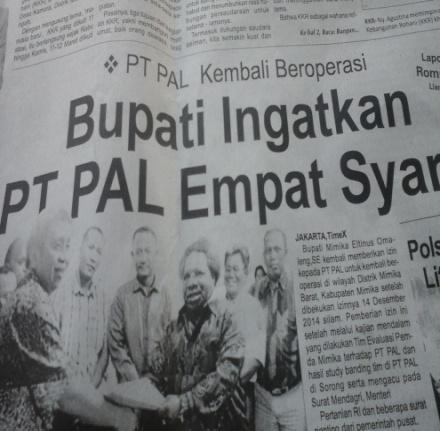
PT PAL telah mengantongi Izin Hak Guna Usaha (HGU) dari pemerintah Pusat sejak tahun 2010 untuk mengembangkan Perkebunan Kelapa Sawit pada lahan seluas 39 ribu hektare. Sebelumnya terbitnya HGU dari pemerintah Pusat, mantan Bupati Klemen Tinal (Kini wakil Gubernur Propinsi Papua) telah mengeluarkan surat ijin atau rekomendasi untuk perusahan itu sejak 2007. Dengan permainan itu dapat merugikan masyarakat setempat maka itu, banyak pihak mengharapkan agar pemerintahan Indonesia Jakarta dan Bupati Mimika untuk mencabut izin pengoperasian Perusahan PT PAL di tanah Amungsa dan Kamoro di Timika Papua.
3. Karyawan/ti
Para karyawa/ti yang kerja di sana lebih banyak Non Papua. Dibandingkan orang asli Papua. Padahal perusahan telah berjanji akan mengutamakan tenaga buruhnya orang asli Papua khususnya orang Amungme dan Kamoro. Namun tidak sesuai kenyataan yang ada di lapangan PT PAL.
Padahal perusahan berjanji tenaga buruh karyawan/ti 80% adalah orang asli Kamoro dan Amungme sementara 20% adalah orang lain atau Non Papua. Semantara ada beberapa karyawan/ti (namanya tidak disebutkan dalam tulisan ini) mengeluh dengan pembayaran gaji yang tidak memadai dan tidak sesuai dengan kerjanya di perkebunan kelapa sawit PT PAL di tanah Amungsa dan Kamoro. Adalah suatu penipuan pada pemerintah Mimika, Pemerintah Propinsi Papua, dan Pemerintah Pusat.
4. Pendidikan
Perusahan PT PAL telah menjanjikan bahwa akan membangun gedung pendidikan. Pihak perusahan sudah mempublikasikan akan memberkati pendidikan anak-anak dari para karyawan/ti. Tetapi pantauan kami akan tempat kerja, ternyata pihak perusahan belum membangun gedung sekolah sehingga anak-anak dari karyawan/ti belum mendapatkan pendidikan di tempat kerja perusahan. Perusahan kelapa sawit sudah melakukan ketidakadilan dan melakukan kehancuran hutan dan lingkungan secara berlebihan tetapi pihak perusahan tidak melaksanakan janji-janji awalnya. Sebaiknya Stop perusahan PT PAL daripada hancurkan Hutan Rimba Papua di Tanah Amungsa dan Kamoro di Mimika Papua.
5. Kesehatan
Ketika pantauan di perusahan PT PAL, Para karyawan/ti mengalami sakit-sakit. Itu diakibatkan karena belum dibangun rumah para karyawan yang layak dihuni. Tetapi perusahan sawit ini hingga kini belum membangun perumahan karyawan/ti. Akibat dari itu, banyak karyawan/ti mengalami sakit-sakit. Penyakit yang diderita adalah penyakit malaria, flu dan pilek, paru-paru bahkan sakit Maag. Pihak perusahan PT PAL tidak memperhatikan dan membiarkan para karyawan/ti berada dalam sakit tanpa penanganan medis.
Padahal dalam presentasi di Hotel Rimba Papua memperlihatkan bahwa kesehatan para karyawan/ti sehat dan tanpa mengalami penyakit apa pun. PT PAL melakukan pembohongan publik agar perusahannya dipercaya dan dilanjutkan pengoperasian dan bahkan membuka lahan baru.
Beberapa orang karyawan/ti (Tidak disebut namanya) ketika diwawancara, memperlihatkan penyakit yang diderita di perusahan tersebut. Memang menyakitkan ketika mendengar keluhan masyarakat di tempat kerja perusahan PT PAL. Perusahan PT PAL telah berjanji akan membangun gedung kesehatan tetapi saya belum melihat gedung kesehatan yang telah dijanjikan. Namun gedung kesehatan tidak ada. Itu dinilai bahwa PT PAL telah melakukan pembohongan publik sementara perusahan menghancurkan ribuan hutan rimpa Papua di tanah Amungsa dan Kamoro.
6. Lokasi
Lokasi perkebunan PT PAL bersebar mulai dari sungai Kamoro di Timur hingga sungai Mimika Barat di jalan Trans Timika-Paniai.
Penutup
Pemerintah Indonesia berpikir kehadiran kelapa sawit di Indonesia akan meningkatkan kesejahteraan ekonomi masyarakat secara memadai. Padahal perusahan-perusahan itu menghancurkan hutan dan lingkungan di tanah air. Lebih nampak terasa kehancuran hutan dan lingkungan adalah di tanah Papua.
Pihak pemerintah Indonesia dan pemerintah Papua tidak berpikir baik, cuek, masa bodoh, dan sengaja hancurkan hutan dan lingkungan tanpa berpikir dampak kepanasan iklim global di dunia ini. Bahkan tidak berpikir kebanyakan orang asli khususnya orang asli Papua yang hidupnya tergantung dari sumber alam semesta. Namun pemerintah Indonesia dan Papua sengaja menghancurkan hutan dan lingkungan agar orang asli Papua mati kelapran dan kesulitan mendapatkan makan dan minum. Hal ini dinilai bahwa pemerintah Indonesia dan Papua sengaja membunuh orang asli Papua.
Kehadiran perusahan kelapa sawit di tanah Papua tidak memberikan manfaat besar bagi orang asli setempat. Masyarakat asli setempat menilai bahwa kelapa sawit bukan lagi sebagai habitusnya. Mereka merasa bahwa kehadiran perusahan kelapa sawit merupakan sebuah penjajahan luar biasa. Bahkan jika terjadi kehancuran hutan dan lingkungan itu sama dengan kehancuran kehidupan orang asli Papua di belahan seluruh tanah Papua. Oleh karena itu, Orang asli Papua mengharapkan pemerintah Indonesia dan pemerintah Papua agar mencari bentuk kerja pembangunan yang ramah lingkungan dan hutan bukan dihancurkan segala sumber semesta alam. Dari pengalaman yang ada di tanah Papua itu, maka mereka menyerukan: Jadikanlah Hutan Papua sebagai tempat produksi buah merah untuk seluruh manca negara.
Timika, 24 Juli 2015
Penulis: Petugas Pastoral Keuskupan Timika-Papua
Daftar Pustaka
1. Borrong, Robert P, Etika Bumi Baru, PT BPK Gunung Mulia, Jakarta 2009
2. Hasil wawancara dengan Tokoh Masyarakat Adat Mimika pada 14 Juli 2015
3. Pedoman Umat Katolik dalam Melestarikan Lingkungan Hidup dan Kementerian Lingkungan Hidup RI , Jakarta 2014
4. Yohanes Paulus II, Ensiklik “Sollicitudo Rei Socialis” Keprihatinan-Keprihatinan Sosial. Departemen Dokumentasi dan Penerangan KWI, Jakarta 1988
5. Media Lokal Salam Papua, edisi 16 Februari 2015
6. Media Lokal Timika Express, edisi 24 November 2014
7. Media Lokal Timika Express, edisi 17 November 2014
8. Media Lokal Timika Express, edisi 16 Maret 2015
9. Media Lokal Timika Express, edisi 11 Juli 2015

